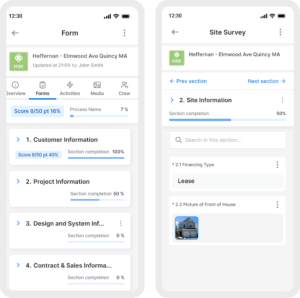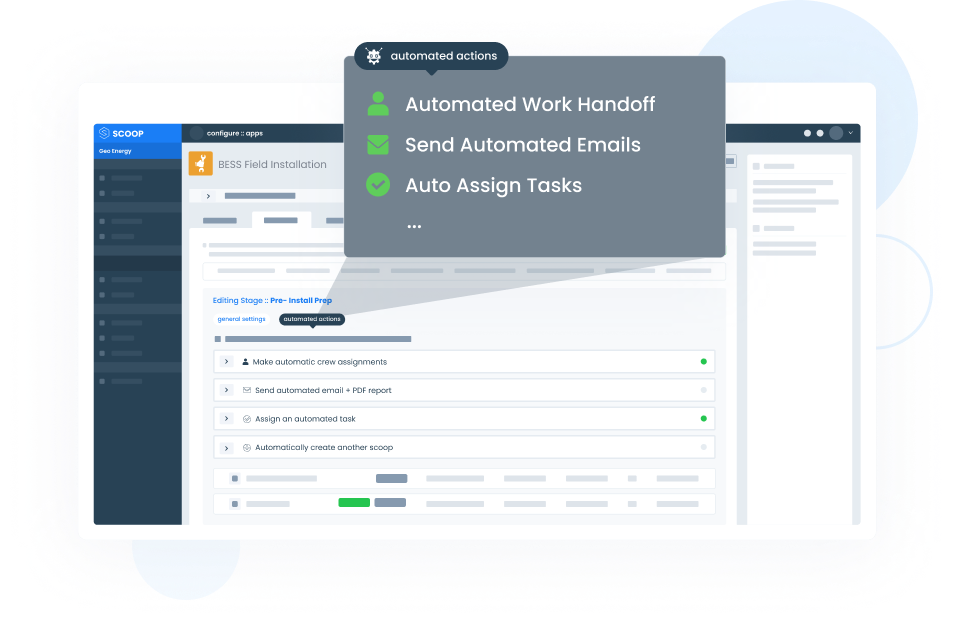Curious about the world of field service management (FSM)? Field service management is transforming how businesses coordinate offsite and field jobs—from scheduling technicians to managing inventories and optimizing assets. For companies that rely on mobile workforces, FSM isn’t just a convenience; it’s a game-changing category of technology for operational efficiency, customer satisfaction, and sales growth.
This guide dives into everything you need to know about field service management, including:
✔️ What field service management is and why it matters
✔️ The main components of field service management, from scheduling to inventory management
✔️ Key benefits of field service management software, like cost reduction and enhanced first-time fix rates
✔️ The role of mobile devices in streamlining field tasks
✔️ Industries that benefit most from field service management solutions
✔️ Future trends in field service management, including AI and IoT integration
✔️ How to choose the right solution for your business
Let’s dive in and make field service management something you’ll feel confident about!\
What is Field Service Management?
Field service management (FSM) is the process of managing company resources deployed offsite, such as field service technicians, equipment, and jobs. It involves coordinating activities like dispatch, repair, and maintenance to ensure efficient operations.
By using field service management software, companies can track resources, manage workloads, and ensure that the work is completed at the correct location. These systems help manage work, location, and resource allocation, leading to smooth service delivery and improved productivity from field teams.
What Are the Main Components of Field Service Management?
1. Project management & tracking
Project tracking is an important part of field service management and the core product of Scoop’s FSM software. It helps with job tracking and ensures technicians are deployed to the right job site. It allows managers to monitor ongoing activities with specialized tools that provide insights into project timelines, resource allocation, and task status, helping to reduce inefficiencies and maintain workflow consistency.
For example, a construction company using field service management can track multiple projects simultaneously and reallocate resources in real time when delays occur in one project. This structured approach ensures that all stakeholders have a clear understanding of project status, enhancing accountability and supporting proactive decision-making.
2. Field service scheduling and dispatch management
Field service scheduling involves assigning technicians to jobs based on real-time data about availability, location, and skill set.
- Advanced planning helps to maximize technician utilization while minimizing idle time.
- Dispatch management leverages automation to assign technicians according to job priority, skill match, and proximity, reducing travel time and improving overall efficiency.
Field service management systems use intelligent algorithms to optimize skill-job matching, ensuring the right technician with the correct expertise is deployed, improving first-time fix rates, and reducing service delays. Efficient field service management workflow also helps streamline task allocation and improve technician productivity.
3. Work order management and reporting
Work order management helps track tasks from start to finish, making field jobs more manageable and providing easy access to task updates. Accurate reporting is essential for effective progress tracking and decision-making, ultimately improving overall performance.
Field service management systems centralize work orders, allowing managers to create, assign, and monitor jobs in one place, with a comprehensive view of task status and requirements. Detailed work order histories, including technician notes, site documents and pictures, and customer feedback, provide valuable insights into operational efficiency and areas for improvement.
4. Inventory management and resource allocation
Inventory management ensures that necessary parts and equipment are available, preventing delays and making it easier to quickly find needed resources. This availability helps technicians avoid unnecessary site visits.
Effective resource allocation gives technicians the tools they need to perform tasks efficiently, which reduces site visits and keeps operations running smoothly. Field service management systems, for instance, integrate with inventory databases to track stock levels in real-time, ensuring that critical components are available precisely when needed.
These systems also send automated alerts to managers when supplies are running low, reducing the risk of service interruptions. This strategic approach to inventory and resource management minimizes wasted time, reduces costs, and enhances overall service reliability, thereby maintaining a consistent workflow built for efficiency.
5. Contract management and service level agreements (SLAs)
Contract management involves overseeing agreements and tracking service level agreements (SLAs). Field service management ensures compliance with contracts and maintains high performance standards, leading to better service fulfillment.
For example, an HVAC service company will use field service management to automatically track contract renewals and identify upselling opportunities based on the client’s service history.
Field service management systems provide centralized contract repositories, making it easier to access and review contract details. Automated SLA tracking ensures that service commitments are met, and alerts are generated when an SLA is at risk of being breached.
This proactive approach helps maintain customer trust and prevents penalties associated with missed obligations. Also, contract visibility enables managers to identify opportunities for upselling or renewing contracts, supporting revenue growth, and fostering long-term client relationships.
What Are the Benefits of Using Field Service Management Software?
Increased operational efficiency
Field service management enhances operational efficiency by optimizing workforce performance. With access to relevant information, field service management enables workers to use standardized forms and checklists for consistent procedures, boosting productivity.
Scheduling tools in field service management help plan tasks accurately, ensuring that the right technician is assigned at the right time, thus avoiding bottlenecks. Streamlined information access and effective scheduling allow field service management to optimize workforce activities, leading to increased efficiency.
Improved first-time fix rates and reduced downtime
First-time fix rates are critical for operational success, and field service management contributes significantly. By providing technicians with complete maintenance histories, troubleshooting guidelines, and precise installation instructions, FSM helps them fix issues correctly the first time, minimizing downtime and enhancing customer satisfaction. Field service management ensures technicians have the proper repair tools, allowing them to complete tasks efficiently, and further reducing downtime.
Enhanced customer satisfaction through real-time communication
Real-time communication is key to customer service in field service management. It uses mobile devices to provide real-time updates to both customers and technicians, improving transparency and responsiveness.
Technicians can access crucial information on-site, while customers receive timely updates, enhancing their overall experience. By improving communication between office staff, technicians, and customers, field service management elevates the quality of service interactions.
Cost reduction and resource optimization
Field service management achieves cost reduction by improving resource oversight. It helps reduce costs by assigning tasks based on technicians’ skills, which minimizes unnecessary expenses.
Efficient scheduling ensures no overlap or downtime, which translates into lower operational costs. Streamlined resource management enhances efficiency and reduces the burden on the company.
What Is the Role of Mobile Devices in Field Service Management?
Real-time data access for field technicians
Real-time data access is crucial for field technicians, and mobile devices enable this effectively, as technicians can access data on parts availability, work history, and troubleshooting while on-site. This capability allows your field team to make informed decisions and perform tasks efficiently.
Standardizes work through digital checklists and forms

Digital checklists are a key feature of field service management that ensures consistent workflows. By using digital forms and checklists, technicians can track necessary tasks, ensuring that procedures are followed accurately.
This improves work quality and minimizes errors, helping technicians perform their work with precision. Standardizing tasks through digital tools benefits both technicians and customers by making operations predictable and reliable.
Makes sure all information captured is automatically synced with office teams
Field service management ensures that information gathered by technicians is automatically synced with the office team. Data captured on-site, such as photos or work status, is instantly shared with the central system for immediate processing through a robust back-end infrastructure. This real-time synchronization helps maintain an up-to-date overview, aiding efficient decision-making and improved coordination.
What Industries Can Benefit From Field Service Management Solutions?
Manufacturing
Manufacturing industries benefit from field service management by ensuring effective repair and maintenance of machinery and equipment. It helps schedule regular maintenance tasks, which prevents breakdowns and minimizes downtime, crucial in production environments.
Technicians use field service management to document field service activities, track parts usage, and ensure each machine functions properly. Field service management in manufacturing improves asset management and extends equipment lifespan, leading to a reliable production process and lower unexpected costs.
Energy and utilities
Energy and utility sectors, whether renewable or traditional, rely on field service management for resource management and service delivery. It helps manage the deployment of technicians to different locations, ensuring resources are used efficiently and services are provided without interruptions.
Field service management enables companies to respond swiftly to maintenance needs and emergencies, whether related to power lines, gas pipelines, or other utility infrastructures. Optimizing the allocation of tools and manpower enhances reliability and reduces service downtime, supporting the smooth functioning of essential public services.
Healthcare
Healthcare relies on field service management to manage equipment maintenance and keep healthcare facilities running smoothly. It schedules technicians to maintain medical devices and ensure compliance with industry standards. The management of field service operations in healthcare focuses on minimizing equipment downtime to improve patient care.
Technicians use field service management systems to track service histories and coordinate repair schedules, ensuring that medical equipment is always available and functioning at its best. This reliability is crucial in environments where equipment failure can impact patient outcomes.
Transportation and logistics
Transportation and logistics industries use field service management to keep fleets and infrastructure in top condition. It optimizes maintenance schedules, ensuring vehicles and logistics equipment are serviced before issues arise. Using FSM, companies can track each vehicle’s service history, manage work orders, and coordinate repair tasks efficiently.
This helps minimize disruptions in operations, which is critical for maintaining the flow of goods and services. Effective field service management leads to better resource planning, fewer breakdowns, and more reliable delivery schedules, helping teams learn and adapt faster.
Telecommunications
The telecom industry leverages FSM solutions to streamline the installation, maintenance, and repair of critical network infrastructure. With Scoop, your field and office teams stay coordinated and on track for every work site—whether it’s tower maintenance, microwave installations, electrical work, or any other type of telecom service.
Scoop helps telecom companies efficiently schedule and dispatch skilled technicians to the right locations with the necessary tools and parts. By providing real-time visibility into field operations and automating work order management, Scoop ensures faster service delivery, minimizes downtime and enhances network reliability. This seamless coordination between field and office teams leads to better resource allocation, improved response times, and higher customer satisfaction.
What Is the Future of Field Service Management?
AI-driven automation and predictive maintenance
AI-driven automation is transforming field service management by making processes faster and more efficient. By automating repetitive tasks, field service management systems free up human resources for critical activities. Predictive maintenance powered by AI enhances FSM by analyzing data patterns to foresee potential equipment failures, allowing proactive maintenance planning.
This combination of AI-driven solutions helps companies optimize workforce deployment, minimize downtimes, and improve overall service delivery. Integrating AI technology in field service management is revolutionizing field operations, making them more intelligent and responsive.
IoT-enabled field service management
IoT-enabled FSM leverages connected IoT devices to gather real-time data and improve service delivery. These devices collect information that helps understand equipment conditions and predict maintenance needs.
Data collection from IoT devices provides actionable insights, enabling technicians to perform more informed repairs. With real-time data flowing from the field, FSM systems can schedule field teams precisely when and where they are needed. This enhanced capability improves efficiency and supports better decision-making.
The impact of hybrid cloud systems on field service management
Hybrid cloud solutions are enhancing field service management by improving field service management scalability and enabling responsive operations. By combining on-premises systems with cloud-based resources, the hybrid cloud allows FSM platforms to deliver real-time operations.
How to Choose the Right Field Service Management Solution?
Choosing the right field service management solution requires considering a few factors to ensure that it meets your business needs.
- Pricing should be evaluated in terms of overall value, looking at whether the solution offers unlimited users or device compatibility, such as Scoop’s pricing model, which includes support for unlimited storage and devices.
- Scalability is another crucial aspect, as it ensures that the FSM solution can grow along with your business.
- Ease of integration with existing systems and mobile compatibility is equally vital, allowing for a seamless user experience and better workforce mobility.
💡 One key point of comparing FSM software is pricing. Evaluating project-based pricing models can be highly beneficial for budgeting purposes, as they provide greater control over costs compared to subscription-based models. That’s why at Scoop, we offer project-based pricing that supports unlimited users and devices—great if you’re looking for scalability without unexpected expenses. By weighing these factors, you can choose a solution that optimizes field service efficiency while delivering a high ROI.
Frequently Asked Questions about Field Service Management
What is field service management software?
Field service management software (FSM) is a tool designed to coordinate and optimize the deployment of offsite resources. Its core functionality includes managing services such as maintenance, repairs, and installations while also tracking equipment, technicians, and work orders.
Why is field service management important for business efficiency?
Field service management is crucial for enhancing business efficiency by allowing companies to streamline operations effectively. However, to fully leverage the benefits of FSM systems, field service management challenges like complex scheduling, resource allocation, and real-time tracking need to be addressed.
With field service management, organizations can improve workforce allocation, automate scheduling, and maintain real-time visibility over field activities. This level of control helps to improve productivity by ensuring that tasks are completed accurately and on time.
How does field service management software improve customer satisfaction?
Field service management software enhances customer satisfaction by providing tools that improve service delivery and communication. With real-time updates, customers are kept informed of technicians’ arrival times, job progress, and completion status, which significantly improves their overall experience. This transparency allows customers to feel more engaged in the service process, reducing uncertainty and building trust.


